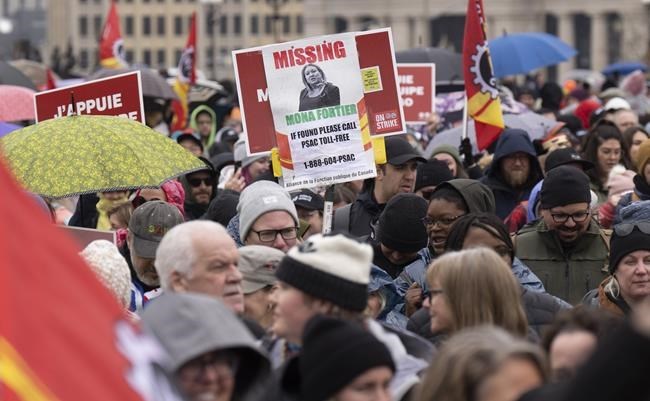OTTAWA — The Liberal government is showing no hints it will legislate public servants back to work as experts warn choosing that path to ending the dispute could come with political repercussions.
Federal workers with the Public Service Alliance of Canada walked off the job nine days ago after contract negotiations with the government couldn't find agreement on issues such as wage increases and remote work.
On Thursday, Labour Minister Seamus O'Regan refused to weigh in on the negotiations and the possibility of back-to-work legislation and said "we want and need an agreement soon."
"Sorry for being so evasive, but I have to be," O'Regan said. "I want a deal."
The government has avoided any questions about back to work legislation since the strike began April 19 and continues to even as the strike drags on and ministers are admitting the impact it is having on government services.
Michael Wernick, who headed the federal public service for three year as the clerk of the Privy Council, said while negotiations continue the government can't discuss a hypothetical like back-to-work legislation.
He said introducing such legislation prematurely could lead to accusations of bad-faith bargaining.
The minority Liberal government would also risk having to find friends among the Conservatives to get the law passed, while alienating the labour movement it has tried to build bridges with over the years.
The NDP says they will not support any back-to-work bill, while the Conservatives have not weighed in on the matter.
Larry Savage, a labour studies professor at Brock University says the Conservatives normally would be in favour of back-to-work legislation. But they might also want to see how much "damage" the strike can do to the Liberals, he said.
"I think if push came to shove, the Conservatives would be hard pressed to not support back-to-work legislation," Savage said.
The federal government has also positioned itself as pro-labour, working with unions and organizations to bolster worker protections, including anti-scab legislation.
Julia Smith, an assistant professor of labour studies at the University of Manitoba, says the "optimist" in her wants to believe that back-to-work legislation isn't being discussed because the government respects the collective bargaining process.
"(But) the cynic in me wants to say that it's probably because the Liberals don't have a majority," Smith said.
In November 2018, when the Liberal government held a majority in the House of Commons, it legislated federal postal workers back to work. It rushed to pass the legislation due to the economic impact of continued mail disruptions during the busy holiday season.
Union leadership declared a stalemate in talks Wednesday but Wernick said it still seems like there has been movement since the strike began and both sides seem motivated to come to a resolution.
"To me, it doesn't look like a standstill," he said.
In an open letter published by Treasury Board President Mona Fortier on April 24, there are four key issues that remain unresolved, including wages and telework.
The outcome of the negotiations will affect 155,000 workers, or about a third of the entire federal public service, including 35,000 Canada Revenue Agency workers whose contract is being negotiated separately.
The federal government is offering a nine per cent wage increase over three years, backdated to 2021. The union says it has adjusted its initial ask for a 13.5 per cent increase over the same period of time — but is not revealing the new number.
The other two sticking points relate to outsourcing contracts and seniority rules in the event of layoffs.
The strike is affecting the delivery of federal services including the processing of immigration files and passport applications.
Immigration Minister Sean Fraser said that in the past week, about 70,000 immigration files that should have been processed were instead put on hold.
"That is a very serious level in the reduction of service," he said in an interview Thursday in Halifax. "The impact has already been serious."
The minister said his department had planned to announce last week that it had returned to the certain service standards achieved before the COVID-19 pandemic took hold in 2020, but the standards dropped as the strike started.
Massive Canada Revenue Agency slowdowns remain at the height of tax season as the filing deadline looms next Monday.
The CRA has said it does not plan to extend the deadline.
While Canadians will be affected differently by the disruption of services depending on their needs, Smith said media coverage of the disruptions could affect the morale of workers and public support for them.
"It's true strikes are disruptive. That's the whole point," Smith said.
"The goal is then it should be pressure on the employer to negotiate a fair deal."
This report by The Canadian Press was first published April 27, 2023.
— With files from Michael MacDonald in Halifax and Jessica Smith in Toronto.
Nojoud Al Mallees, The Canadian Press




